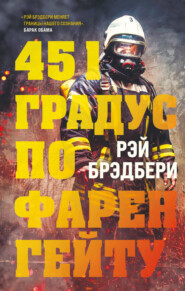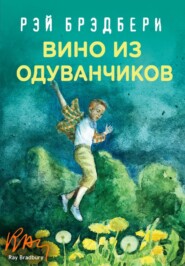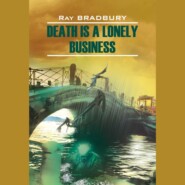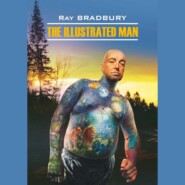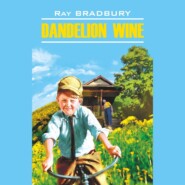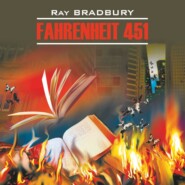По всем вопросам обращайтесь на: info@litportal.ru
(©) 2003-2024.
✖
I Sing the Body Electric
Автор
Год написания книги
2018
Настройки чтения
Размер шрифта
Высота строк
Поля
Charlie let his heart beat two or three times.
“Fred … what you going to do?”
“Stay on awhile. Stuff a few birds the local boys bring in. Then crank the old Tin Lizzie and drive that new superfreeway myself going nowhere, anywhere, and so long to you, Charlie Moore.”
“Night, Fred. Hope you sleep.”
“What, and miss welcoming in the New Year, middle of July…?”
Charlie walked and that voice faded behind and he came to the barbershop where three men, laid out, were being strenuously barbered behind plate glass. The highway traffic slid over them in bright reflections. They looked like they were drowning under a stream of huge fireflies.
Charlie stepped in. Everyone glanced up.
“Anyone got any ideas?”
“Progress, Charlie,” said Frank Mariano, combing and cutting, “is an idea can’t be stopped with no other idea. Let’s yank up the whole damn town, lock, stock, and tar barrel, carry it over, nail it down by that new road.”
“We figured the cost last year. Four dozen stores at three thousand dollars average to haul them just three hundred yards west.”
“So ends that master plan,” muttered someone under a hot-steam towel, buried in inescapable fact.
“One good hurricane would do the job, carriage-free.”
They all laughed quietly.
“We should all celebrate tonight,” said the man under the hot towel. He sat up, revealing himself as Hank Summers, the groceryman. “Snort a few stiff drinks and wonder where the hell we’ll all be this time next year.”
“We didn’t fight hard enough,” said Charlie. “When it started, we didn’t pitch in.”
“Hell.” Frank snipped a hair out of the inside of a fairly large car. “When times move, not a day passes someone’s not hurt. This month, this year, it’s our turn. Next time we want something, someone else gets stepped on, all in the name of Get Up and Go. Look, Charlie, go form a vigilantes. Mine that new road. But watch out. Just crossing the lanes to place the bomb, you’re sure to be run down by a manure truck bound for Salinas.”
More laughter, which faded quickly.
“Look,” said Hank Summers, and everybody looked. He spoke to his own fly-specked image in the ancient mirror as if trying to sell his twin on a shared logic. “We lived here thirty years now, you, me, all of us. Won’t kill us to move on. Good God, we’re all root and a yard wide. Graduation. School of hard knocks is throwing us out the door with no never-mind’s and no thank-you’s. I’m ready. Charlie, are you?”
“Me, now,” said Frank Mariano. “Monday morning six a.m. I load my barbership in a trailer and shoot off after those customers, ninety miles an hour!”
There was a laugh sounded like the very last one of the day, so Charlie turned with one superb and mindless drift and was back on the street.
And still the shops stayed open, the lights stayed on, the doors stood wide, as if each owner was reluctant to go home, so long as that river out there was flowing and there was the great motion and glint and sound of people and metal and light in a tide they had grown so accustomed to it was hard to believe the river bottom would ever know a dry season.
Charlie lingered on, straying from shop to shop, sipping a chocolate Coke at the malted-milk counter, buying some stationery he couldn’t use from the drugstore under the soft fluttering wood fan that whispered to itself in the ceiling. He loitered like a common criminal, thieving sights. He paused in alleys where, Saturday afternoons, gypsy tie salesmen or kitchenware spielers laid out their suitcase worlds to con the pedestrians. Then, at last he reached the gas station where Pete Britz, deep in the oil pit, was mending the dumb brute underside of a dead and uncomplaining 1947 Ford.
At ten o’clock, as if by some secret but mutual consent, all the shops went dark, all the people walked home, Charlie Moore among them.
He caught up with Hank Summers, whose face was still shining pink from the shave he hadn’t needed. They ambled in silence for a time past houses where it seemed the whole population was sitting out smoking or knitting, rocking in chairs or fanning themselves against a nonexistent hot spell.
Hank laughed suddenly at some private thought. A few paces on, he decided to make it public:
“Yes, we’ll gather at the River.
River, River.
Yes, we’ll gather at the River
That flows by the Throne of God.”
He half-sang it and Charlie nodded.
“First Baptist Church, when I was twelve.”
“The Lord giveth and the Highway Commissioner taketh away,” said Hank, drily. “Funny. Never thought how much a town is people. Doing things, that is. Under the hot towel back there, thought: what’s this place to me? Shaved. I had the answer. Russ Newell banging a carburetor at the Night Owl Garage? Yep. Allie Mae Simpson…”
He swallowed his voice in embarrassment.
Allie Mae Simpson … Charlie took up the count in his own mind … Allie Mae fixing wet curlicues in old ladies’ hair in the bay window of her Vogue Salon … Doc Knight stacking pill bottles in the drug emporium cases … hardware store laid out in the hot noon sun, Clint Simpson middle of it all, running his hands over, sorting out the million blinks and shines of brass and silver and gold, all the nails, hinges, knobs, all the saws, hammers, and snaked up copper wire and stacks of aluminum foil like the junk shaken free of a thousand boys’ pockets in a thousand summers past … and then…
…then there was his own place, warm dark, brown, comfortable, musky as the den of a tobacco smoking bear … thick with the humidor smells of whole families of odd-sized cigars, imported cigarettes, snuffs just waiting to be exploded on the air…
Take all that away, thought Charlie, you got nothing. Buildings, sure. Anyone can raise a frame, paint a sign to say what might go on inside. But it was people that made the damn thing get.
Hank surfaced in his own long thoughts.
“Guess right now I’m sad. Want to send everyone back to open their shops so I can see what they were up to. Why wasn’t I looking closer, all these years? Hell, hell. What’s got into you. Hank Summers. There’s another Oak Lane on up the line or down the line and people there busy as they are here. Wherever I land, next time I’ll look close, swear to God. Good-bye, Charlie.”
“To hell with good-bye.”
“All right, then, good night.”
And Hank was gone and Charlie was home and Clara was waiting at the screen door with a glass of ice water.
“Sit out awhile?”
“Like everyone else? Why not?”
They sat in the dark on the porch in the chain-hung wooden swing and watched the highway flush and drain, flush and drain with arrivals of headlight and departures of angry red fire like the coals from an immense brazier scattered to the fields.
Charlie drank the water slowly and. drinking, thought: In the old days you couldn’t see the roads die. You felt them gradually fade, yes, lying in bed nights, maybe your mind got hold of some hint, some nudge or commotion that warned you it was sinking away. But it took years and years for any one road to give up its dusty ghost and another to stir alive. That’s how things were, slow arriving and slow passing away. That’s how things had always been.
But no more. Now, in a matter of hours.
He paused.
He touched in upon himself to find a new thing.
“Good,” said his wife.
They rocked awhile, two halves of a similar content.






